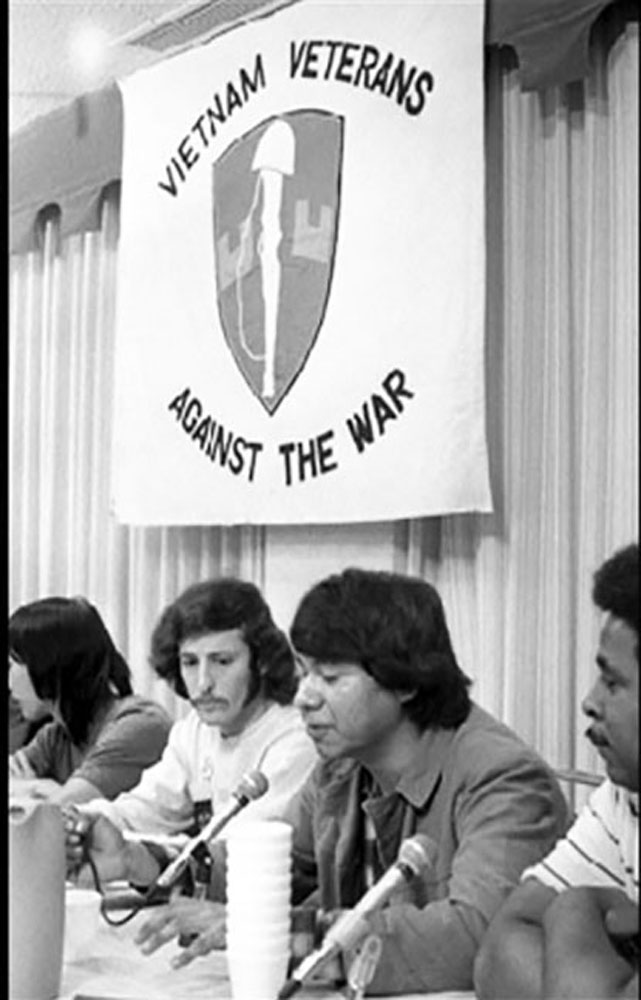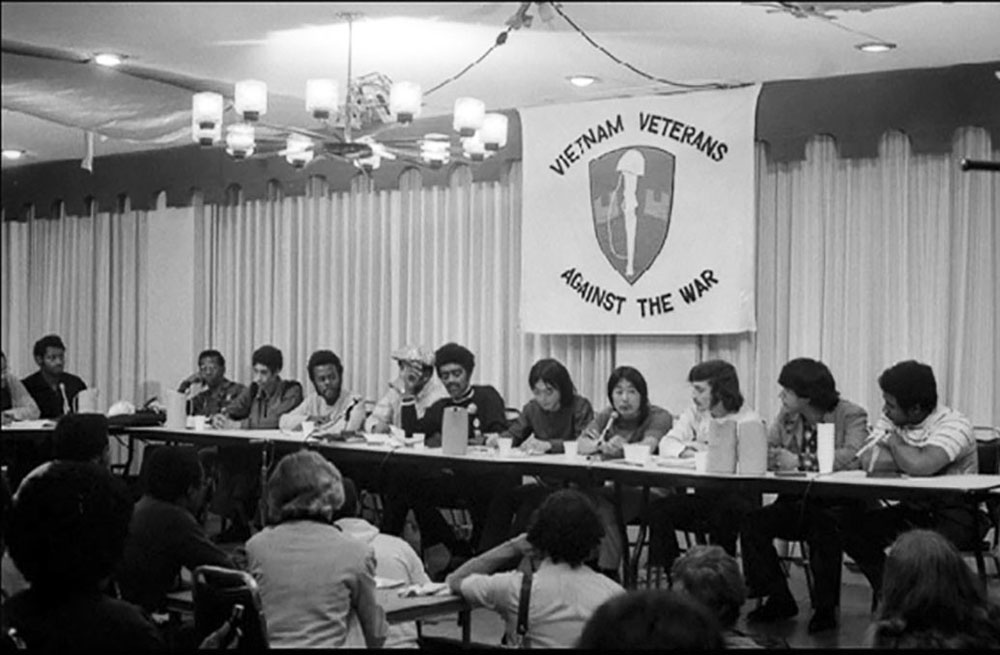 |
Memories of the Winter Soldier InvestigationBy Barry Romo as told to Jeff MachotaInterview with Barry Romo conducted by Jeff Machota on March 6, 2021. JM: Jeff Machota - Interviewer BR: Barry Romo JM: So, as 1971 started, where were you living? What was your role in the anti-war movement and VVAW at that point? So, January of 71. BR: I was just a member of the local anti-war group, which was at our community college. We had a ton of people. I was doing GI anti-war work by working and helping provide security for the GI projects in San Diego and LA. In San Bernardino, we had three projects, one at Twentynine Palms, one at Norton Air Force Base, and one at March Air Force Base, which was a B-52 base. JM: So, you were not affiliated with VVAW at this point; this was organic anti-war stuff that had formed in that area? BR: Right, and 90% of males were Vietnam vets, in fact. Everything from Marines, Army and Air Force. I can't remember having a Navy vet. It was when Kent State happened. I became anti-war. Kent State and Cambodia invasion both. I went to see where the anti-war movement was after giving a tiny speech at an anti-draft rally. People said I should go to the campus newspaper office. It was just full of people, who were vets. Only one was a German vet. We were also working on the George Jackson defense committee, before he was murdered. It was called the Soledad Brothers. We were working on various Panther support stuff as well. JM: Were you aware of VVAW as a national organization at that point? BR: No. What happened was, at the beginning of 1971, people came and told me there was going to be a war crimes tribunal, in Detroit, by Vietnam Vets Against the War, to expose the racist and whatever nature of the War. They said I should go because I had talked about some of the stuff we had done and stuff I had witnessed. I got in contact with VVAW. They gave me a free plane ticket to Detroit. I got picked up, I think not by VVAW people, but by anti-war labor people who were auto workers. They were multinational, Black and White. That impressed me. Then, I got interviewed. That was my first time in Detroit.
JM: Did you testify at Winter Soldier? BR: I testified and I chaired the Americal Division. That was people in the 196th and 11th Brigade. JM: You didn't testify on that panel, you testified on a different panel? BR: No, I testified. We had a spontaneous revolt by the Third World people. Of course, we didn't know what PTSD was, then. They were only talking about war crimes, horrible things. And so, Scott Shimabukuro and the other Asian vet from LA, who were Marines and a Black guy from the Revolutionary Workers Congress, I think; told me that they were going to have another panel and I should come and represent the Chicano point of view. JM: So, at that point, those people were just in attendance, they weren't actually on any panels. BR: Oh no! They were on panels, but the panels were all by unit. On those panels, they mostly talked about individual war crimes, not about institutional racism or institutional torture, murder, and rape. So, the Third World guys demanded and held a panel. The testimony you see in the Winter Soldier film, that was all from the Racism panel, which was spontaneous. We were afraid people were going to kill themselves. JM: So you were in kind of a spontaneous uprising against the framework that the VVAW at that time had set up for the event? BR: Yes. JM: So, you chaired the Americal panel and you testified on the Third World panel. Did you testify at a different one at all? BR: That was it. We were the very last panel. So you can imagine three days of insanity. JM: The Americal was the last one, or the Third World? BR: The Americal. The Thirld World panel was in between. JM: So, any moments that stand out from the panels that you were on? BR: Of course, Evan Haney and the AIM perspective; that killed everybody, including Black or Asian or Chicano or White, anybody. I mean everyone cried when Haney started talking. Because it [the panel] was supposed to go after institutional racism and lies and stuff and institutional torture of people. He talked about the history of the US with Native Americans. He compared Westmoreland with Custer. How they promised many things, which they never kept, talking about the US government. The thing they kept was the promise that we [Native Americans] could keep our land until the rivers shall flow and the crops shall grow. Now the one thing they do keep; cause the rivers aren't flowing and the crops aren't growing. JM: And so the audience was completely enraptured by all this? BR: Right. And the other people! I think Earl Rose talked about; he said "you know I'm going to Vietnam and I'm killing people. I'm looking at the Vietnamese and I'm calling them gooks and I'm thinking that's the same thing; I'm called a nigger in the US. That's the same thing that I was doing with the Vietnamese." Then he brought up institutional Racism. JM: It looks like the moderator was Donald P. Williams. The participants were Scott Shimabukuro, Barry Romo, Evan Haney, Earl Rose, Alan Akers, Charles N. Stephens, William Light, Orville Carey, Larry Brooks, and Murphy Lloyd. That's a pretty big panel. BR: Well, I only spoke for only about a couple of minutes. I think I said the problem with Chicanos and Brown people is cultural and language, which throws in even more institutional Racism and shit. JM: Any memories on the Americal panel? BR: I was completely burned out. It was near the end of the whole event. JM: You all stayed at the hotel that was there, the Howard Johnsons, or whatever? BR: No. I think some of the National people stayed there. I stayed at a private, non-vet citizen's, who was a leftie. I ran into her daughter [later]. I was speaking at a private school in Lincoln Park [Chicago], sponsored by a Black teacher. This woman came in and said "you stayed at my house in Detroit." This is like three years ago. She had a copy of one of the Winter Soldier's with the poster on the back. She said that "we stayed in contact with you guys for a while." She brought the poster over to prove she wasn't lying. Right after Winter Soldier, we went to Canada to meet with Vietnamese. Nixon said "if you want to be in NATO, you can't let these VietCong in." We were supposed to meet them. We drove up. I couldn't go in, after three days of reminiscing about slaughtering the Vietnamese and stuff. The guy who drove us was a vet who testified. He said he wasn't going to go in either. So, we sat in the car the whole time. I said "there will come a time when I can." It was the Vietnamese Student Association, in Canada, which was anti-war. There were just tons of students there. JM: PTSD wasn't really acknowledged as a thing yet at that point. Did VVAW have any mechanisms to help people out who were testifying? BR: No. You look at how much better IVAW did by having the decompression stuff [at WSI II in 2008]. JM: What happened next? BR: I go home. I hang out with all the people at Valley [the junior college], and the anti-war people. I got a call asking me to become California Coordinator of VVAW. Further recollections of 1971 to be continued in the Fall 2021 issue of The Veteran. Barry Romo is a long-time leader of VVAW. Jeff Machota is a member of VVAW's National Staff.
|



